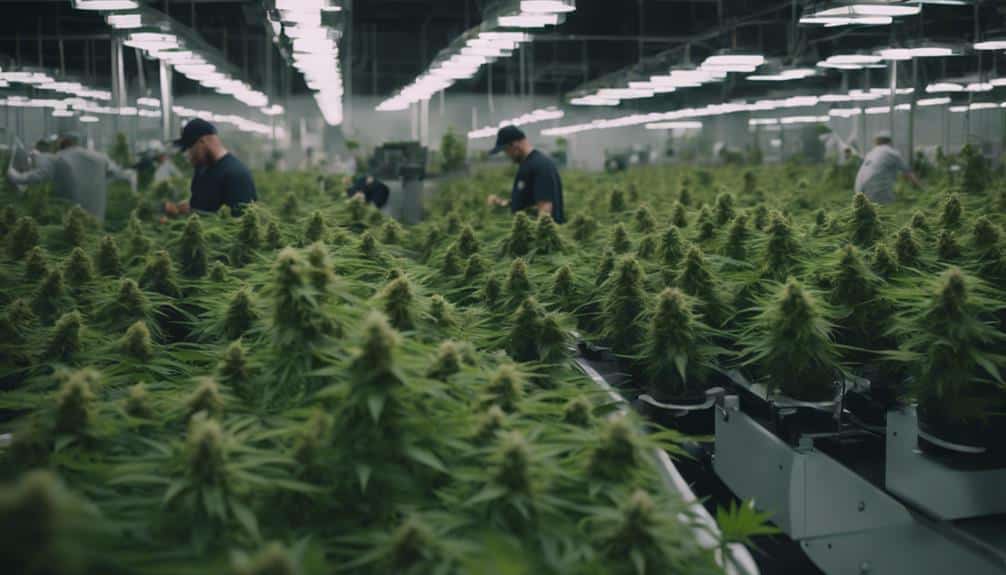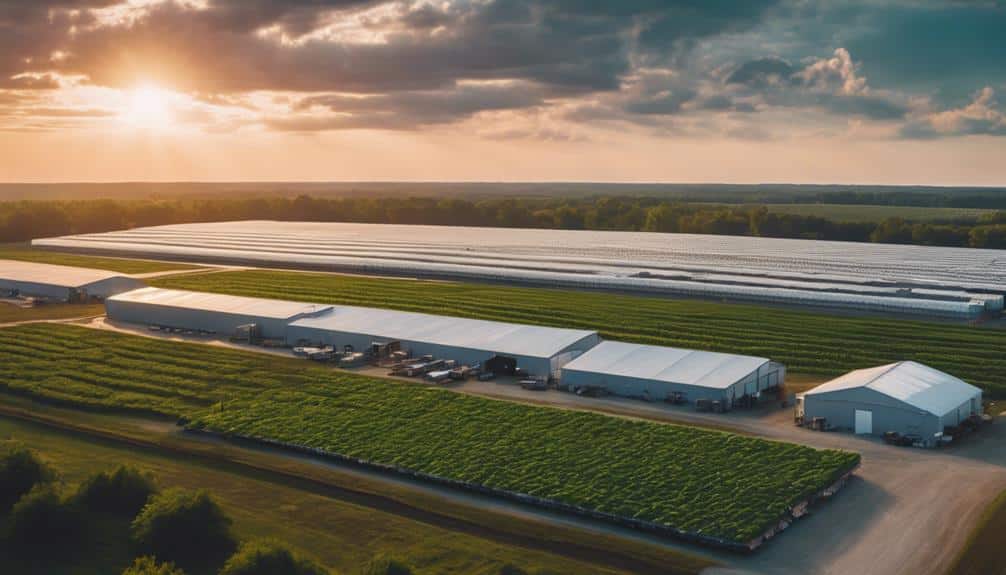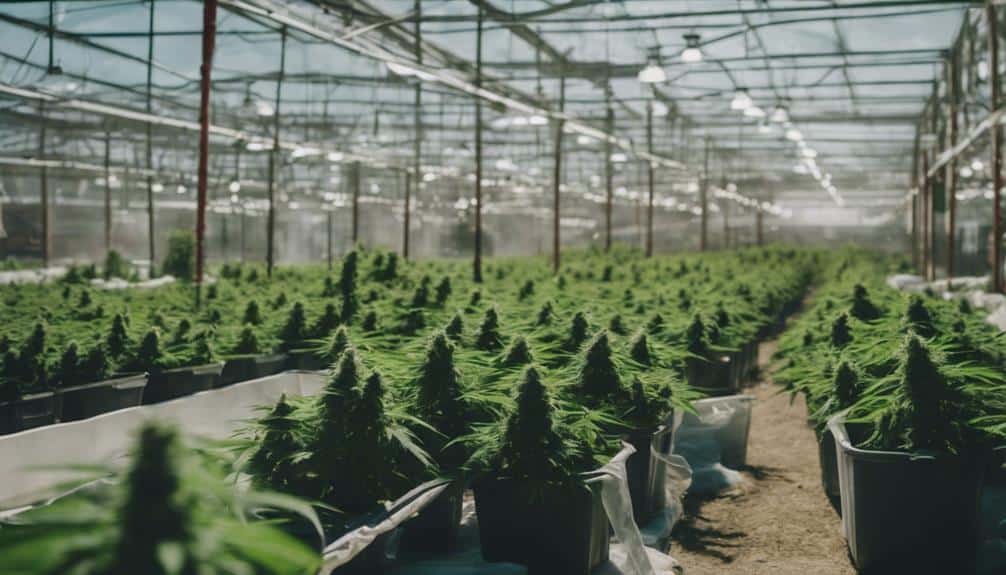Consider the impact when a single industry significantly boosts job creation, tax revenue, and business opportunities in your state. That’s exactly what Delaware’s medical marijuana sector has done, transforming the economic landscape. The job creation alone has been remarkable, spanning cultivation, dispensary operations, and ancillary services. Tax revenues have surged, funding critical public services like healthcare and education. But the real intrigue lies in how local entrepreneurs are capitalizing on these opportunities, driving community investments and property values. Interested in understanding the broader implications and future projections for this burgeoning industry? There’s much more to explore.
Table of Contents
Job Creation

Since its legalization, Delaware’s medical marijuana industry has generated thousands of jobs that have significantly impacted local employment rates. By analyzing the data, you can see how this industry has contributed notably to workforce development across various sectors.
The jobs created range from cultivation and processing roles to retail positions in dispensaries. This diversification helps stabilize employment rates by providing opportunities for a wide array of skill sets.
The industry’s employment impact isn’t just limited to direct jobs; ancillary services such as security, transportation, and compliance roles have also seen growth. This ripple effect leads to broader economic benefits and more robust workforce development.
For instance, there has been a surge in demand for specialized training programs which provides educational institutions and vocational schools with new areas of focus.
In addition to this, hiring trends indicate a preference for local talent, ensuring that the economic benefits stay within Delaware. This focus on local employment not only reduces joblessness but also fosters a sense of community and shared purpose.
Tax Revenue Growth
So how has Delaware’s medical marijuana industry significantly boosted state tax revenues, and what do the numbers reveal about its fiscal impact?
Since the legalization of medical marijuana, Delaware has experienced a significant increase in tax revenues. In the past fiscal year alone, state tax receipts from this sector surged by 20%, reflecting the growing consumer base and expanding dispensary network. This influx of funds has been strategically utilized thanks to well-planned revenue allocation.
The government of Delaware has used tax incentives to attract and sustain businesses within the medical marijuana industry. These incentives have encouraged investments leading to more dispensaries and cultivation facilities. This in turn has expanded the tax base providing a stable source of revenue for the state.
Revenue allocation has been meticulously planned to benefit various public services. Funds generated from medical marijuana taxes have been allocated to healthcare initiatives, educational programs, and infrastructure improvements. By strategically distributing these funds, Delaware ensures that the economic benefits of the medical marijuana industry translate into tangible improvements in public welfare.
Business Opportunities

The burgeoning medical marijuana industry in Delaware presents lucrative business opportunities as evidenced by the rapid expansion of dispensaries and cultivation facilities. As this market expands further, you can capitalize on several avenues not only to generate profit but also to serve the community’s health needs effectively.
Consider these burgeoning opportunities:
- Dispensary Ownership: With an increasing number of patients requiring medical marijuana, opening a dispensary can place you at the forefront of market expansion.
- Cultivation Facilities: Investing in cultivation operations secures a steady supply of high-quality products, which is essential for maintaining dispensary stocks.
- Ancillary Services: Engage in businesses like security, compliance consulting, or marketing; all are vital for the industry’s growth.
- Technology Solutions: Develop software for inventory management, patient tracking, or online sales platforms to offer streamlined services to dispensaries.
Data reveals that Delaware’s medical marijuana market is poised for significant growth reflecting strong investment potential. The state’s supportive regulatory environment further bolsters confidence among entrepreneurs.
Leveraging these opportunities can yield substantial financial returns and contribute to the well-being of patients relying on medical marijuana for treatment. By tapping into this expanding market, you’re positioned to make a meaningful impact while enjoying economic gains.
Patient Benefits
While business opportunities abound, it’s equally important to understand the profound benefits that medical marijuana offers to patients in Delaware. The state’s medical marijuana program provides critical patient access to alternative treatments particularly for those grappling with chronic pain. According to the Delaware Division of Public Health over 6,000 patients have enrolled in the program highlighting its widespread impact.
Data supports medical marijuana’s efficacy in pain management. A 2019 study from the National Academies of Sciences Engineering and Medicine concluded that cannabis is effective for chronic pain treatment in adults. For many patients it serves as a viable alternative to opioids potentially reducing risk of addiction and overdose. Delaware’s regulatory framework ensures that patients can obtain medical marijuana through licensed dispensaries offering a controlled and safe environment.
Moreover, patient access to medical marijuana isn’t just about physical relief; it also encompasses improved quality of life. Surveys indicate that patients using medical marijuana report better sleep, reduced anxiety, and enhanced overall well-being.
Local Entrepreneurship

Local entrepreneurs in Delaware are actively participating in the state’s expanding medical marijuana industry by establishing dispensaries and cultivation centers. This not only caters to the needs of patients but also fuels economic growth in the region.
Entering this market poses challenges due to substantial startup costs and the intricacies of regulatory frameworks. Understanding these factors is crucial:
- Ancillary Services: Apart from dispensaries and cultivation centers there is a rising demand for ancillary businesses such as security firms legal consultancy and marketing agencies.
- Economic Contributions: The industry is creating new jobs and boosting tax revenues which can be utilized for community services.
- Startup Challenges: Entrepreneurs encounter hurdles like funding acquisition compliance with strict regulations and efficient supply chain management.
- Community Impact: Successful ventures can strengthen local economies and improve patient access to medical marijuana fostering a supportive community environment.
Real Estate Impact
In relation to Delaware’s medical marijuana industry it’s vital to consider how it’s impacting local real estate markets and property values. The growing industry has led to noticeable property appreciation in areas where dispensaries and cultivation centers are established. Properties near these facilities often see a rise in value driven by increased demand and the economic activity they generate.
Commercial leases in Delaware have experienced significant shifts. For instance landlords are finding that properties suitable for medical marijuana operations can command premium lease rates. These commercial spaces which meet stringent regulatory requirements are particularly attractive to businesses looking to enter the market.
Data shows that areas with medical marijuana facilities often report a 5-10% increase in property values within a year of establishment. This appreciation isn’t limited to commercial properties; residential areas nearby also benefit from the enhanced economic climate.
However, it’s important to approach this trend with a balanced perspective. While the industry can drive up property values, it also raises concerns about zoning compliance and community impact. For those invested in serving others understanding these dynamics is crucial for making informed decisions in real estate investments and community planning.
Supply Chain Development

The development of Delaware’s medical marijuana industry’s supply chain hinges on efficient logistics regulatory compliance and strategic partnerships. To guarantee patients receive quality products you need to focus on several key areas that drive the supply chain’s effectiveness and sustainability.
- Cultivation Techniques: Advanced cultivation techniques enhance the consistency and potency of medical marijuana. Hydroponic systems and controlled environment agriculture should be employed to optimize yield and quality.
- Distribution Logistics: Effective distribution logistics are vital for timely delivery. Implementing a streamlined transportation network ensures that products reach dispensaries quickly and maintain their integrity.
- Inventory Management: Accurate inventory management helps prevent shortages and overstock. Using real-time tracking systems and analytics you can monitor stock levels and predict demand.
- Strategic Partnerships: Building partnerships with reliable suppliers and distributors strengthens the supply chain. These alliances can provide stability and access to cutting-edge technologies.
Focusing on these areas ensures that Delaware’s medical marijuana industry remains robust and responsive to the needs of patients. Efficient cultivation techniques and distribution logistics not only improve product quality but also enhance patient satisfaction. By prioritizing these elements, you’re contributing to a supply chain that delivers consistent, high-quality medical marijuana to those who need it most.
Regulatory Framework
To navigate Delaware’s medical marijuana market effectively, you must understand the intricate regulatory framework that governs cultivation, distribution, and patient access. The Department of Health and Social Services (DHSS) in Delaware oversees this sector enforcing stringent licensing requirements for all operational facets.
The process for cultivators, distributors, and dispensaries begins with obtaining a compassion center license from the state. The number of these licenses is limited making the application process highly competitive.
Understanding compliance costs is essential as well. Initial expenses include application fees which can run into thousands of dollars. Once operational ongoing compliance costs include regular state inspections security measures adherence to health standards among others.
Maintaining strict security protocols such as surveillance systems secure storage can have a significant impact on your budget. The regulatory framework also demands meticulous record-keeping reporting; every plant must be tracked from seed to sale ensuring transparency and accountability.
This level of regulation aims to prevent diversion and ensure that medical marijuana reaches only those patients with valid prescriptions.
Community Investments

Understanding the regulatory framework is just the beginning; substantial community investments are pivotal for fostering local support and promoting sustainable growth in Delaware’s medical marijuana industry. By focusing on education initiatives and philanthropic efforts, you can see how this industry isn’t just an economic engine but also a community partner.
To illustrate, consider these key areas where community investments are making a difference:
- Education Initiatives: Companies are funding programs in local schools to educate youth about the medical applications and risks of marijuana aiming to cultivate a well-informed next generation.
- Job Training Programs: Investments in vocational training for local residents ensure that the community benefits directly from new job opportunities within the industry.
- Healthcare Contributions: Philanthropic efforts include donations to local health clinics partnerships with hospitals to enhance public health services.
- Community Development Projects: Funds are directed towards building maintaining public infrastructure such as parks recreational facilities improving quality of life for all residents.
The aforementioned community investments not only build goodwill but also create a sustainable symbiotic relationship between the industry and Delaware’s residents. By prioritizing these initiatives, you can help guarantee that the medical marijuana industry thrives contributes positively to the community.
Future Projections
As market trends evolve and regulatory landscapes shift it’s vital to analyze how Delaware’s medical marijuana industry is projected to grow in the coming years. Technological advancements are set to play a pivotal role in this expansion. Enhanced cultivation techniques for instance could lead to higher yields better-quality products. Innovations in extraction methods product formulations are also expected to diversify offerings meeting specific patient needs more effectively.
Market expansion is another important factor. With an increasing number of states legalizing medical marijuana Delaware’s industry could benefit from cross-state collaborations knowledge sharing. This potential for expansion isn’t just limited to product sales; it includes job creation from cultivation processing retail compliance sectors. Projections indicate that the industry could see a 15-20% annual growth in job opportunities.
Moreover, the integration of data analytics and artificial intelligence can streamline operations making the industry more efficient cost-effective. By adopting these technological advancements businesses can better predict market demands manage supply chains ultimately driving sustained growth.
Conclusion
You’ve seen how Delaware’s medical marijuana industry is transforming the state with a staggering 20% increase in tax revenue funding vital projects; the economic benefits are undeniable.
The sector has created thousands of jobs driving local entrepreneurship boosting property values. As technology advances and the market expands this sector’s growth looks promising.
Keep an eye on this industry—its sustained prosperity is shaping Delaware’s economy in significant ways.
If you’re curious to learn more about how medical marijuana is making a difference in Delaware, I invite you to visit Cannabis Docs of Delaware or give us a call at (855) 420-6797.
We’re always here ready and willing to answer any questions you might have help you understand more about this exciting industry!

